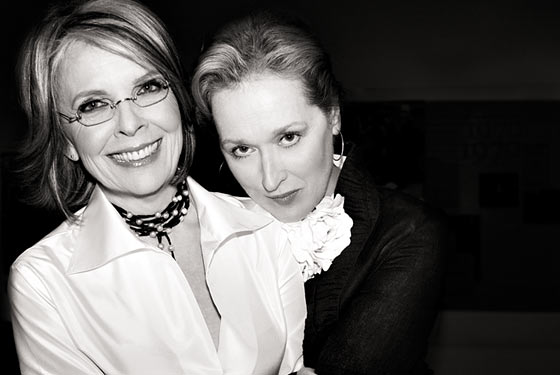
On the phone last week, four hours before her sold-out Film Society of Lincoln Center tribute, Diane Keaton told me what she dreaded most about the evening. “How do you express gratitude?” she asked. “That seems to me to be the most difficult thing.” Such a tantalizing remark from a performer: It wasn’t the exposure that scared her most; it was having to acknowledge the people who came to praise and cheer. A riven exhibitionist, Keaton normally makes a show of hiding in public. Tonight, she’d have to lose the hat and dark glasses, smile big, and take the compliments without flinching.
I spent time with her two decades ago for a Rolling Stone piece. She was like a Girl Scout leader—lively, gracious, on. But I got nothing. I wasn’t asking about Woody and Warren. I stuck to the work, and she stuck to the ether. Not the lah-dee-dah-la-la ether. It was all on the level of, “Oh, yeah, Mrs. Soffel, I got to kiss Mel Gibson, not too hard, lemme tell you.” I ended up raving about Shoot the Moon, that it was a breakthrough, the first time she seemed to let herself be X-rayed by the camera. She said, “Oh, yeah. Hmmm. Too bad nobody saw it.” She stunk at expressing gratitude.
The tribute was notable for the brilliance and hilarity of the speeches and the remarkable lack of specificity. It was as if no one would—or could—violate her exaggerated sphere of privacy. Woody Allen strolled onstage in a sweater: I’m Woody Allen, I don’t have to wear a tux and sit in a box with mortals like Steve Martin and Meryl Streep. He called her “Keaton,” not “Diane,” and covered his evident discomfort with mock hostility that didn’t, once or twice, seem so mock. But then he addressed her, with tremulous sincerity, as “my guiding light”—and coming after clips of Sleeper, Annie Hall, and Manhattan, only Lennon reaching out to McCartney could have felt sweeter. The world was suddenly a better place.
Martin Short killed. I laughed so hard at his puckish non sequiturs I almost didn’t mind that there wasn’t a memorable word about Keaton. Steve Martin was less full of himself, but he too spoke of her as an ideal—and only briefly attainable. The women brought us closer. Sarah Jessica Parker began the evening with a funny, genuinely humble tribute to an actress who combined the screwball grace of a Carole Lombard with a distinctly modern self-awareness. The writer and director Nancy Meyers, who helped relaunch Keaton with audiences in both Baby Boom and Something’s Gotta Give, remembered their discussion of the latter’s nude scene. “Diane said, ‘I guess somebody my age should be naked in a movie. It might as well be me.’ ”
It was Streep who caught Keaton best. She alone spoke of acting with her—of being awed by the way, in their big scene in Marvin’s Room, “she walked up to the edge of her own fears.” (That means something from Streep, who works hard when she acts to keep us from seeing her fears.) She said she suspects that Keaton’s “flutter” and “whirligigs” are “a bit of a feint to distract attention from her formidable intelligence,” and I suspect she’s right—and that the real Keaton in Annie Hall isn’t the one who slaps her head and splutters but the one who sits beside Alvy Singer on a park bench, wickedly characterizing the passersby.
Conclusive evidence came from Keaton’s speech, which was beautiful and searching—a fusion of her lives as an actress, director, photographer, and lover of famous creative men. “All my life I wanted to perform,” she began, then went on to describe herself standing in her driveway singing her heart out to the night sky but in her first public performance bursting into tears and running offstage. Now when she acts, she can do it “in secret, with a small family called the crew.”
Apologizing for her grandiosity, she spoke of “a parade of intensely romantic encounters with extraordinary people.” She had just watched Annie Hall for the first time since it came out, in 1977, and saw “that young woman who used to be me grasping for some way to express the delight she found” in Allen’s Alvy Singer. In Reds, she saw a look of forgiveness on the face of Warren Beatty’s John Reed that somehow traveled into the present. Sometimes after the terror of acting passes, she said, you “do reach a beautiful plateau, you do discover a moment in time that does feel like it will live on forever.”
She sang a verse from “Seems Like Old Times” the way she did in Annie Hall, trembled audibly, then quoted a character in her underrated second feature, Unstrung Heroes, who says, “Documentation is key.”
“Looking at us then and looking at us now is all the documentation I needed to recognize that these encounters, no matter how fleeting, are all I know of heaven.”
